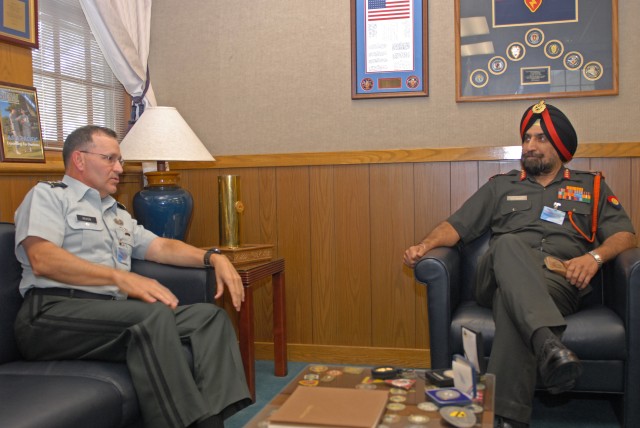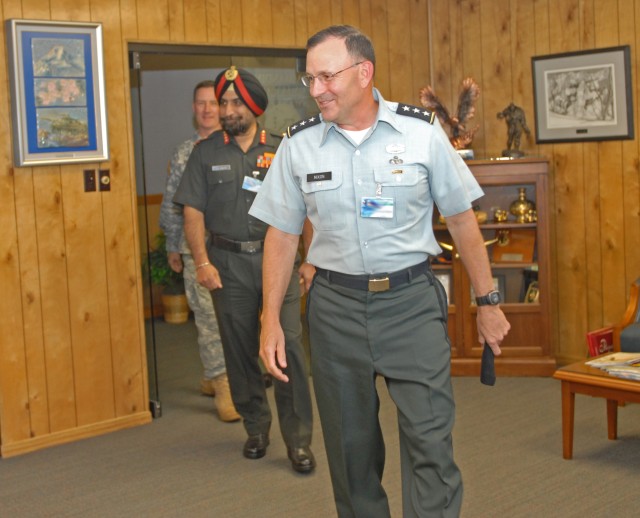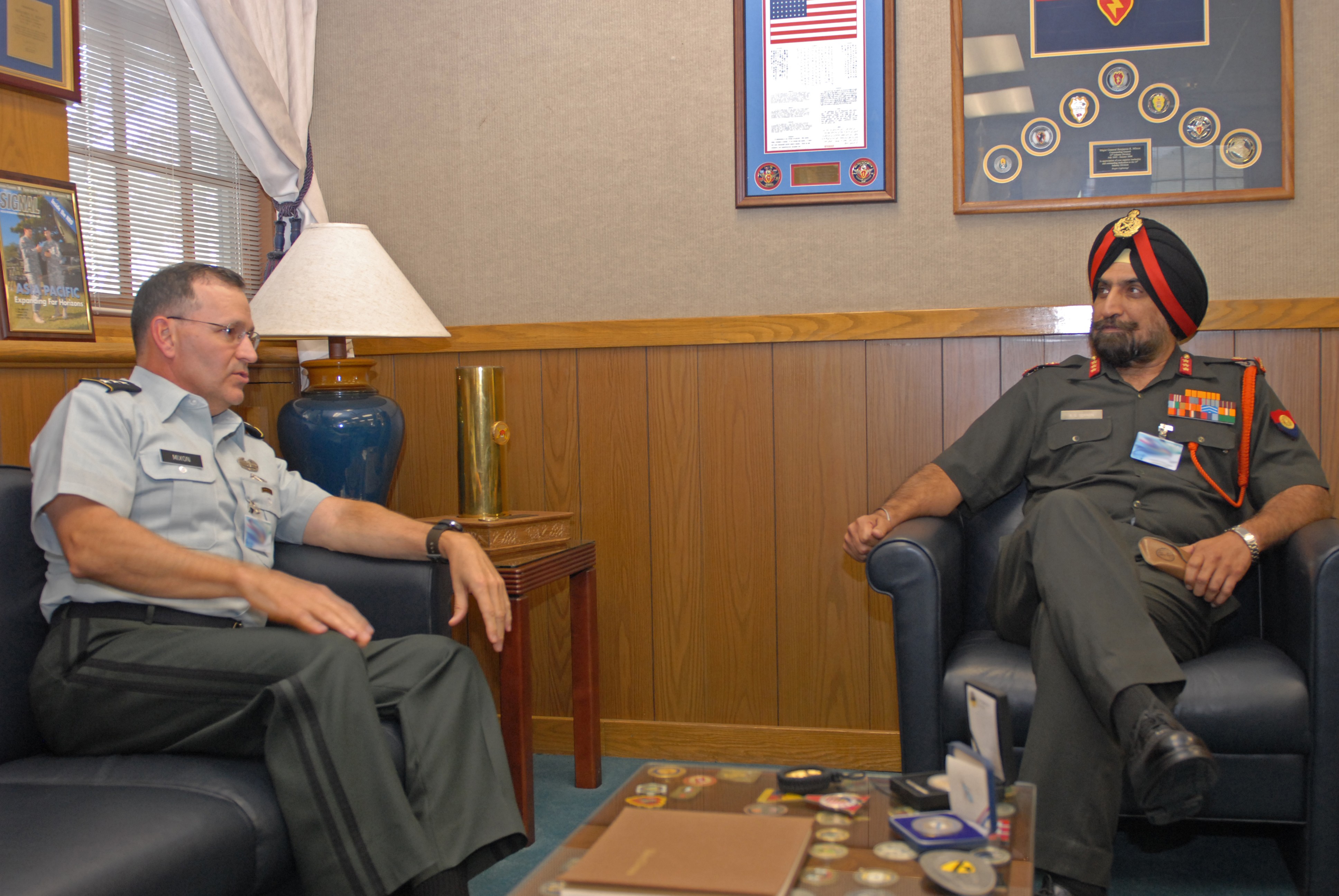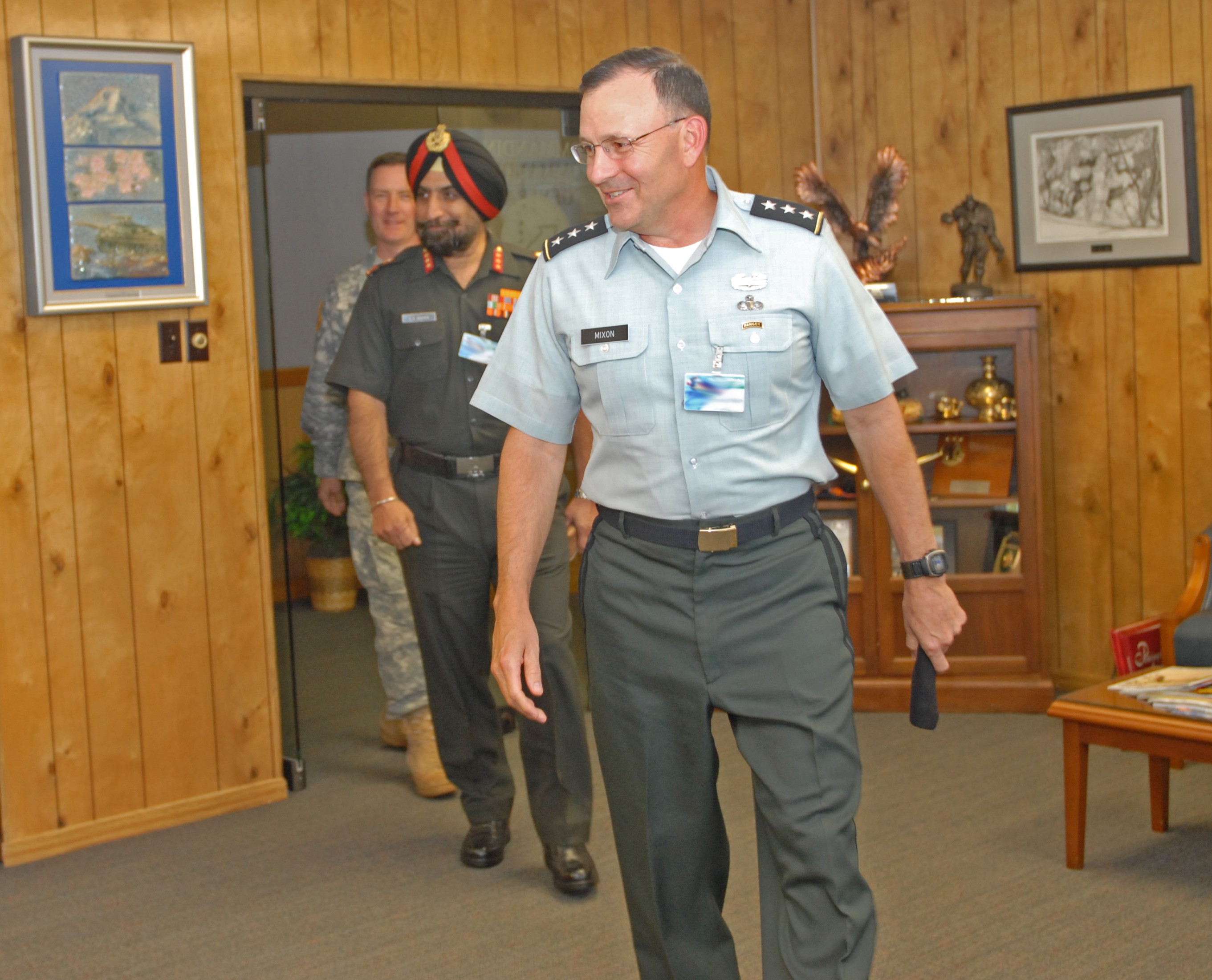What is the purpose of the ESG'
LTG Mixon: The executive steering group's principle purpose is the coming together with the Indian military to share ideas and also to chart the way ahead for future training exchanges and training exercises.
LTG Sekhon:
We've got the policy group at the executive level of the defense secretaries which formulates the general direction in which this U.S. cooperation is to move. The ESG's purpose is to put those things on the ground, in practical terms as for the Army to Army cooperations.
Why is your relationship with the U.S. Army important'
LTG Sekhon: I think it's very important because there are such similarities between the two of us. The reality of life is that the U.S. is a very important country. It's a major global player, a leader of sorts, and we have commonalities with the U.S. in terms of a democratic way of life, we are both secular, and I think a more or less common way of life. The way that we look at the world affairs, international affairs and all. We think that in years to come, it is very, very natural for the two of us to cooperate with each other and help each other to sort things out wherever it is possible.
What is the objective of this year's India ESG'
LTG Mixon: The personal objective is, as the general said, to chart the way ahead. This is how we do exercises and exchanges over the next two years with the Indian military, but also, it also gives us a great opportunity to share ideas. Our discussions today were focused on counter-insurgency operations. We've learned a great deal from the operations that the Indian military has done and shared a few of the ideas and things that we've learned recently from our deployments too.
What importance do you place on this year's Executive Steering Group'
LTG Sekhon: There is great importance because this is one forum where we take stock of what has already been done and the way out and lay out the roadmap for the future year, for the coming year and years to come. It is essential for us to take a stock of things because of certain things which have been done in total and certain shortfalls which can be improved in the years to come. As we are graduating from a very low level of cooperation and exercising to higher levels, unit level and formation level and above, there is a need for a forum to consolidate things and the roadmap, and that is the primary focus of this ESG We have recently done a brigade level command post training and we are looking as to how it can be taken forward.
What is the expected result from the ESG'
LTG Mixon: The expected result will be the formulation of the plan that will cover by the next two years and beyond our exchanges, but really when you look at it from a strategic perspective, the real resolve to it is a greater understanding of a region. India is a major player in the world and in the Pacific region and they are an example for many other countries as to how a democracy can operate in a multi-cultural environment. Relationships that we establish are vitally important to the security of the region, so really it covers a broader expanse than just the exercises, it's about building relationships, and the relationship that the American Army has with the Indian Army is one of the most valuable relationships we have in the region.
What types of training do your military forces look forward to when they're training with the U.S. forces'
LTG Sekhon: We are conducting all kinds of training, to start with, a focus on the war on terror. We are also facing similar problems from our side, so we have a lot to learn from each other with training. We have been jointly training with counter-insurgence missions, Special Operations, as well as conducting exercises with the Marine Force. The focus so far has been on the counter-insurgency and counter- terror. In years to come we would like to expand the scope to training under a U.N. mandate, peacekeeping, counter-hijack, hostages rescue, amphibious operations. Today, we heard the Americans giving of their experiences in Iraq, I think that we have a lot to learn from in terms of technology, education and networking, so I think there's a lot of scope for us to train on.
Why is our relationship with India important'
LTG Mixon: As I just mentioned, India is a significant global power as well as a regional power. The security within the Asia-Pacific region really has been dramatically influenced by India and its activities in the region. That is really foremost in our thoughts. As the general mentioned, we can certainly see that in the future, UN-types of missions with disaster relief and peacekeeping in the Pacific or anywhere in the world is certainly very important to our relationship.
Have the recent terrorist attacks in Mumbai changed your military strategy'
LTG Sekhon: We are still figuring out how to deal with that, because each terrorist is different from the last one, so it would be premature for me to say that we have changed strategy. We are still trying to figure out the respond to that imperious options...'... table...'... out of the street. We will be thinking about how best we can respond to something like that.
Did the recent terrorist attacks in Mumbai have an impact on our relationship with India'
LTG Mixon: From the perspective, the fact that we were also victims of the terrorist attack of 9-11.We've seen terrorist attacks in other countries, Great Britain, Spain, and the impact it has on us is the absolute understanding that terrorism can be exported world-wide. We work with our allies and partners in the region to try to prevent these types of terrorist attacks. Working together is one of the better ways that we can battle against these terrorists. It has certainly heightened awareness and underscored the importance of our relationship with India.
How do you see your relationship with the U.S. military unfolding in the future'
LTG Sekhon: It's going to become more ...'... it's going to become stronger and stronger. That's the only direction it will go to. I'm sure it is in the years to come that we will come much closer and Army to Army we'll have greater cooperation. We will get it to a stage where we can jointly mandate. That's the end result which we look forward to I'm sure.
###




Social Sharing